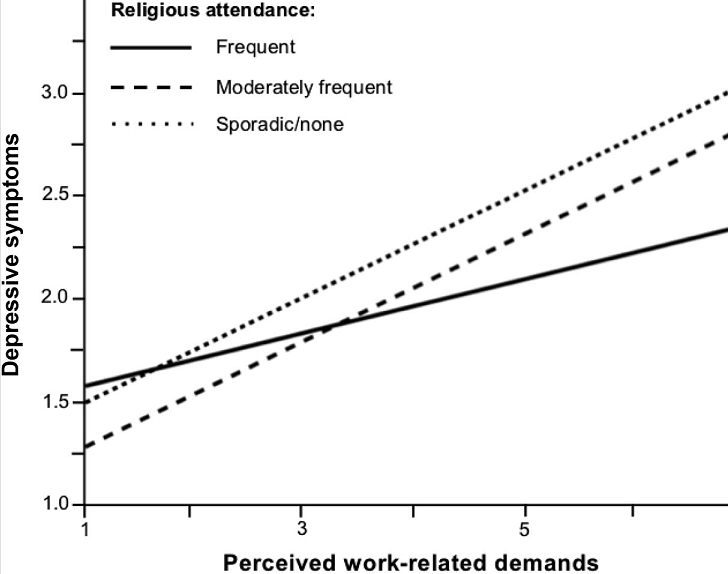Over the past two decades, the Polish economy has undergone dramatic change as it shifted towards a liberal market. That, in turn, has lead to profound changes in job security and other social changes that can lead to increased stress.
Clemens Lechner, from the University Friedrich Schiller University of Jena, and colleagues, have used data from a 2009 survey of over 1,500 Poles to assess whether religion buffers this stress. All the people interviewed were aged 16-46 and were currently employed.
They looks at two aspects of stress. The first measured how depressed and anxious people felt. This is the flipside of ‘happiness’ and is basically a short-term measure of how people have been feeling of over the past month.
The other measure was a measure of general work and life satisfaction. Questions around life satisfaction reflect longer term, more deep-rooted attitudes.
 They also asked them about the work-related demands they had experienced over the past five years. Questions assessed their agreement with statements like “..it has become more difficult to plan my career path” and “…the risk of losing my job has increased.”
They also asked them about the work-related demands they had experienced over the past five years. Questions assessed their agreement with statements like “..it has become more difficult to plan my career path” and “…the risk of losing my job has increased.”
What they found was that, overall, religious people (whether measured by belief or attendance) tended to be happier and more satisfied. But the increased happiness of the religious was particularly noticeable for people who had high work related demands.
As you can see in the figure, for sporadic or moderately frequent attenders, as work-related demands go up so do depressive symptoms. For frequent attenders, however, that increase is much less dramatic. They saw a similar result for beliefs.
Strangely enough, however, they saw exactly the opposite effect for life satisfaction.
People who attended religious services frequently reported higher life satisfaction if work-related demands were low, but this difference disappeared if their work-related demands were high.
And although beliefs were linked to higher satisfaction, there was no interaction with work-related demands.
Lechner and colleagues explain this curious results as follows – although first they point out that the overall effect is small.
One possibility is that happiness is easier to influence – and so whatever factors that link religiousness with happiness and satisfaction are more able to overcome the negative effects of work-stress on happiness than they are on the more fundamental feeling of life satisfaction.
The second explanation is more complex. What they argue is that, in condition of high work-demand, optimistic people may feel crushed, and social support become dependency on others – both of which could lead to dissatisfaction with life in general.
It’s an interesting hypothesis, and I’m not sure what it tells up about the directionality of the link between religion and life satisfaction.
Personally, I wonder if there isn’t some effect of social status going on here. Although they controlled for employment type, education, age and other factors, and found little effect, it’s possible that the model didn’t fully account for this important contributor to satisfaction.
And, as they point out, Poland is is a religious country, with a single highly dominant faith (Catholicism). It would be interesting to see if similar effects hold in more diverse countries!
![]()
Lechner, C., Tomasik, M., Silbereisen, R., & Wasilewski, J. (2012). Exploring the Stress-Buffering Effects of Religiousness in Relation to Social and Economic Change: Evidence From Poland. Psychology of Religion and Spirituality DOI: 10.1037/a0030738
 This article by Tom Rees was first published on Epiphenom. It is licensed under Creative Commons.
This article by Tom Rees was first published on Epiphenom. It is licensed under Creative Commons.













